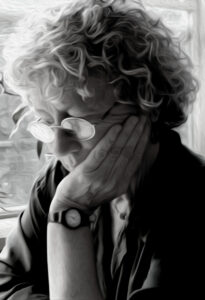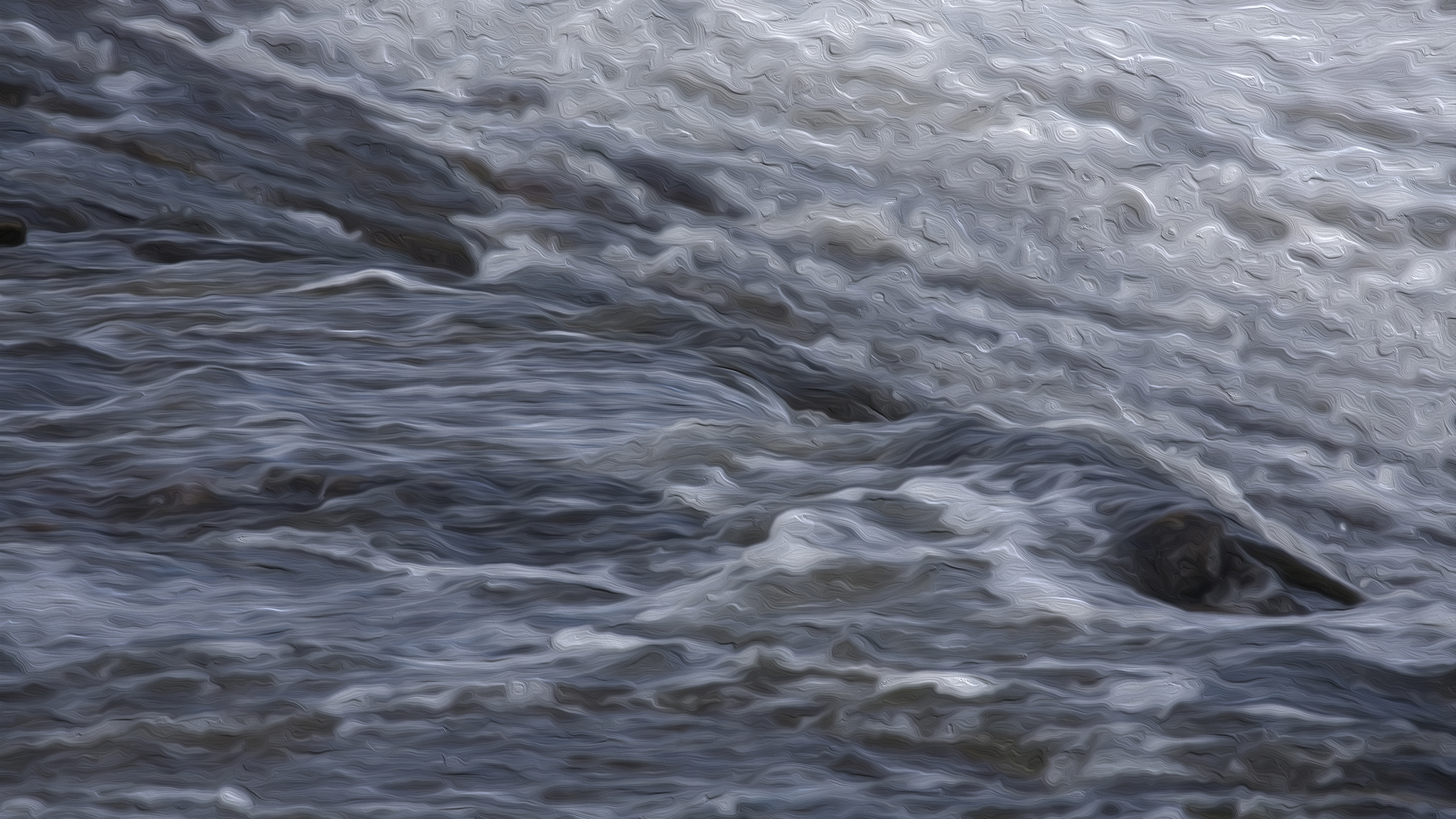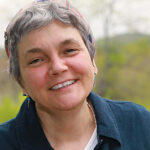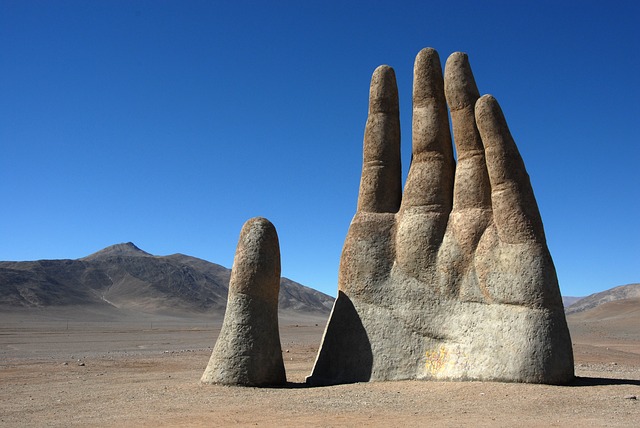In April 2015, Bauhan Publishing published Sparks from the Anvil: the Smith College Poetry Interviews, a collection of interviews of great poets by writer and teaching artist Christian McEwen. Throughout the year, Teachers & Writers Magazine will publish highlights from this impressive book. Here, McEwen and Jean Valentine hold a subtle, deeply meaningful conversation about the importance of teachers (and readers) in a young poet’s life, about spirituality, and about Valentine’s great friendship with T&W founder Grace Paley.
Jean Valentine won the Yale Younger Poets Award for her first book, Dream Barker, in 1965. Her 12th book of poetry is Break the Glass (Copper Canyon Press, 2010). Her next book, Shirt in Heaven, is coming out from Copper Canyon in May 2015. Door in the Mountain: New and Collected Poems 1965–2003 was the winner of the 2004 National Book Award for Poetry. The recipient of the 2009 Wallace Stevens Award from the Academy of American Poets, Valentine has taught at Sarah Lawrence College, New York University, and Columbia University. She lives in New York City.
Christian McEwen: When you were small, your mother used to read aloud to you.
Jean Valentine: Oh that meant so much to me. She read us nursery rhymes. I think that’s when I first loved poetry—hearing our mother read to us. And I had an older sister who loved books, and that was a great gift too. She’d give me a book by Yeats, or something. You know, not as a young child, but as an older teenager. She’d tell me good poets to read. She loved poetry as well.
CM: When did you actually begin to write?
JV: I guess around eight or nine. We went to public school in California. There was no homework. And so we could just read at night, and I used to say that I was writing poems.
CM: Were you sharing them with other people then?
JV: Probably with my sister. And then when we went back to the East Coast, I’d show teachers what I was doing. I got a tremendous amount of encouragement from teachers. God bless the teachers! Right along, from probably sixth grade onward. It meant the world, because, you know, it gave you a feeling maybe you could do something.
CM: And who were you reading in those days, apart from Yeats?
JV: Well, I found great delight in ee cummings. I think it was because we were being taught everything that was correct in school of course, and he was doing everything incorrectly! I was rebellious too, and I liked that.
You must never lose heart. Never lose heart.
CM: Borges says somewhere, “Writing is nothing more than a guided dream.” And I remember your lines in Little Boat, “My dream life is more vivid than my waking life.” So many of those poems read as if they’d been taken directly from dreams. All that beauty and elusiveness and strange authority.
JV: You know, I was taking a course with a poet at college, Edwin Honig, and he said you could write from your dreams. And at that, I really sat up. So I must have already been really loving my dreams. Or at least been affected by them. Because that was like a huge door opening to me which has never closed. And who knows if I would have done it otherwise, you know? Somebody is just there at the right moment. Someone says the right thing. I love dreams, and I love their power; I still to this day keep a notebook right by my bed. Oftentimes it’ll get me into a poem.
CM: Do the dreams welcome being written about? Or are they so private that it’s odd to have the reader’s eyes on them?
JV: When I was young, I didn’t know if anyone would understand anything I wrote. I’ve pretty much all my life thought, “Is this too weird for a poem? Is this something that makes sense to you?” and I’ve shown my work to friends who are poets. Occasionally, some things don’t seem so bad to me, or so odd. But some things do. And so I check them over with friends.
CM: The sound and syntax in your poems, they are splintered—fragmented—and yet they work beautifully.
JV: I just—I get bored with ordinary language when I’m trying to write poems. Not in ordinary speech. But when I’m trying to write a poem, I want it, as the quote says, “just to be as alive as it can be.” Again, if it makes sense to me, then I’ll try it on other people. If it’s really odd, or what I think might be too fragmentary, too splintered, I’ve been blessed with friends who’ll look at it, and tell me what they think. And sometimes they say, “Yeah, I don’t know what you’re talking about.” So then I’ll have to make it better.
But I do find ordinary speech is pretty splintered, pretty fragmentary. Even ordinary speech, you know. So it’s usually pretty alive, or can be made so. I think it’s a matter of pace. I like a lot of poetry that’s perfectly slow, but it doesn’t interest me to write. God knows, there are wonderful poets. But, for some reason, I get bored with writing work that’s just in a very expected, slow pace. I don’t think it’s how people speak or how they think, actually. So that’s what I’m after.
To be understood…by somebody. If even one person understands you, you can grow, you know.
CM: I wanted to ask what religion you had as a child. Because there’s a presence of the spirit through your poems.
JV: For some reason I don’t remember or understand, it’s been important to me my whole life. My own family didn’t really practice a religion. It had to do with looking for something outside of the house, or outside of the run of things, when I was a child. I was always very much looking for something more than was apparent, since I was quite small. It didn’t come from my family.
A poet asked me recently—we were sitting around having tea, and he asked, “Do you believe in the afterlife?” and I thought later, “Did he actually ask me that?” You know, it was so unusual. I don’t know if I do or not. But I believe in something, and whatever it is, it feels interesting to me.
Another person who was there said, “Well, we mustn’t ever make the mistake of feeling safe. All evidence to the contrary.” I think it’s a Buddhist thing—she’s someone who’d done a lot of Buddhist study. I think it’s about going toward the danger rather than running away from it. And then the sword turns into a flower—you know, that teaching. So I think that’s what she was saying, and I think that’s in me by now, because I’ve studied with a lot of Buddhist teachers, and I love them. I think they’re wonderful—just amazingly sane and…life-forces! I do feel very alive about that. About the spirit.
CM: Do you meditate regularly? Has that become your form?
JV: I was a Catholic convert for a while. And I’ve met many wonderful people in different faiths. But I think, the most clear to me now, if it could be said to be clear, would be the Buddhist. I think the sitting is very good, for me. New York, of course, is Paradise if you’re looking for a Buddhist teacher—they’re on every block. And there are some wonderful ones.
CM: Absolutely. It’s very rich. And then too, sitting in meditation and being open to the changing mind is not so different from opening oneself to dreams. In either case, it gets you out of the rational. Out of the practical mind.
JV: That’s right. Thank you. You’ve articulated something for me. It is. Because you are going under the surface of the water, I guess. You are allowing something to come in that’s probably always there.
CM: And yet, one of the names you mention in your poems was Grace Paley. I remember Grace saying long ago that she wasn’t interested in traditional religion. But, she said, “That doesn’t mean I don’t believe in mystery.”
JV: Yeah. Oh yes, she did! She certainly did believe in mystery. She was teaching at Sarah Lawrence when I got my job there, and we taught in offices next to each other. How lucky was I! Our offices were right next to each other, for probably fifteen years. It was just wonderful. Also, I got to ride in with her. Not out to school, but home in the afternoon or evening. So we became good friends. You know, I’d have these ideas, and she’d just laugh at me some of the time. [Imitates GP’s voice.] “You know, Jeannie…”
But she was also very generous. I was completely out of it politically. And there I was working at Sarah Lawrence College, which was very, very political at that time, especially the corner where I had my office, which was right next to Grace. She had on the bumper of her car, “No More Nukes!” And this is how out of it I was, I said, “Grace, what are nukes?” I did. And she didn’t make fun of me at all. She said, “Oh Jeannie, those are the nuclear bombs.” And in that car, driving home, I got my education. There were some very smart people in the car, of whom I’d never have asked a question. But since she was there, I would say, “Grace, what is this thing about the personal and the political?” That was a riddle to me. I didn’t mind saying so to Grace, because she was so kindly. She was a wonderful teacher in that way, in the way of being a friend, so you could ask dumb questions and she wasn’t going to laugh at you. She really would teach you what was going on.
CM: What else did teaching give you that you didn’t have beforehand?
JV: Well, it actually gave me friends. I had these conversations like we’re having now. I had wonderful conversations about poetry with people. I never had those before. Nobody really was interested. Or if they were, I was too shy to approach them. But I could talk about poetry three days a week if I wanted to. In fact I did. That was my job! So that made it much less lonesome, you know. And oftentimes, when those students would grow up, they’d come back with some work, and we might become friends.
And then, the faculty. Like Grace. And so my life became much less lonely. I had lived with a man who was a fiction writer, but he didn’t read poetry. And then I had children. I was doing office work where I could find it. And all of that was good, but it wasn’t so good. It was bringing in a bit of money but it wasn’t giving me company. Having students is wonderful, I think. It has been for me, anyway.
CM: Reading between the lines, or sometimes along the lines, was depression something you’d had to deal with in your life…and if poetry had been…a way of finding a form for it, maybe? Using it as a lens, rather than just a grief?
JV: I was just thinking about that, actually. I was having dinner with some friends, and they were talking about this [Silver Linings Playbook] movie, which I haven’t seen. It’s about manic depression, which I didn’t have, thank God, and how that could be made better, or healed even, by an artistic discipline. The fellow I was talking to was a psychiatrist, and he had a student who had embraced the arts, and using that as a discipline had enabled him to live with whatever form of depression or manic depression he had.
And I went home that night…and I thought, “Well, maybe poetry did that for me.” Because I did have depression, but I was so in love with poetry. For a period of five years, I wasn’t writing, and that was hard. But I got through it. So, maybe poetry has been that for me, you know. And if so, it’s another reason to love it.
CM: There are some lines in Little Boat, where you say,
The door is fallen down
to the house
I used to try & pry open,
in & out,
painfully,
stiff tears.
Has poetry in some ways grown easier as you have grown older? More fluent? Or maybe just more mysterious?
JV: Hmmm. I think both. I wouldn’t say easy. But I think more joyful. More fluid? Definitely. I had that five years when I had a lot of change and grief in my life, and I wasn’t writing. That was like a turning point, and since then, I have found things more joyful. I would never say it’s easy. You just have to go a long way to get anything you like. But it’s more…more of a pleasure. There’s some light coming to it. Yes.
I think I was made more human by being in a marriage and by having children.
CM: I’m so glad. What was it like for you in those early child-rearing years, before you began to work at Sarah Lawrence, and found those other teacher-poets, other allies? I remember an essay Eavan Boland wrote about Sylvia Plath, where she asks, “What is it that changes when a woman poet becomes a mother?”
JV: Well it’s a good question. I think for me—I think I was made more human by being in a marriage and by having children. Much more open to others. It was a matter of getting up early in the morning, to have a couple hours in the day. But I did have a couple of hours in the day, you know. I didn’t have the kind of desperate time that Plath had, with cold and isolation. I didn’t have that, thank God. But I think it’s made me feel much more in the human race, to have married and had children. Even though my marriages haven’t lasted, the children have; and one of them has children. I think it put me in the human family a little more, which I’m very grateful for. I think it was another opening to love.
New York, of course, is Paradise if you’re looking for a Buddhist teacher—they’re on every block.
CM: And in some of your more recent poems, you’ve been talking on the cusp of your own mortality, knowing you’re not going to be here forever, as of course none of us will be. I love those poems: “My shining, your shining life draws close, draws closer.” Where are you with that subject, that knowledge that all of us have, that we have less and less time, and that we don’t know when that time will end.
JV: I think I’ve been writing more elegies. That’s probably natural if you get to be the age I am. I don’t think they’re elegies for myself. Maybe you just become more elegiac, because you see things going by. Your own life, but also other people’s lives. You know more and more people who have died, or are dying.
Also, I wonder, when that happens to a person, if they begin to see that their own death will be coming along. If they become more conscious of the other deaths around them, like the death of the Earth if that’s what’s going to happen. I feel much more moved by that. So when I write an elegy, I don’t feel as if it’s an elegy only for that person. I feel like there’s a lot of change going on.
There are a lot of things that are going away. Old churches, certain ways of governing, things like that. Some of it might be the weather, and some of it might be the polar ice caps. So I feel that if I write an elegy, it’s not just for this friend, or just for my own age. Maybe people tune into that more when they get to be a certain age. Or is it the time we’re in? I was just having lunch with a great-niece of mine, and she was saying, “We’ve had extinction five times on this earth already.” And I said, “Have we?”
I wonder what they were writing about in those days, you know. Or drawing pictures about. If they had time.
CM: I’d like to ask you one last question. And I’m thinking of your great-niece, and of other apprentice writers, too. If you were to talk to a young woman trying to be a poet now, in her own muddle and privacy, what would you advise her, what would you like her to know?
JV: Oh, I’d like her to know she can! And she must never lose heart. Never lose heart. And find someone who understands her. Find another poet, maybe who’s older. Somebody who knows what’s she’s doing. That’s been so important for me. To be understood, you know. By somebody. If even one person understands you, you can grow, you know.
—February 25, 2013
Northampton, Massachusetts
Editor’s Note: This interview has been edited and condensed for space considerations and clarity.

Christian McEwen is a freelance writer and workshop leader originally from the U.K. She is the author of several books, including World Enough & Time: On Creativity and Slowing Down, now in its eighth printing. She edited Jo’s Girls: Tomboy Tales of High Adventure; Sparks from the Anvil: the Smith College Poetry Interviews; and, with Mark Statman, The Alphabet of the Trees: A Guide to Nature Writing. Christian has enjoyed residencies at Yaddo, MacDowell, Mesa Refuge, and the Virginia Center for the Creative Arts, and has received a fellowship in playwriting from the Massachusetts Cultural Council. Her new book, In Praise of Listening, will be published in October.



